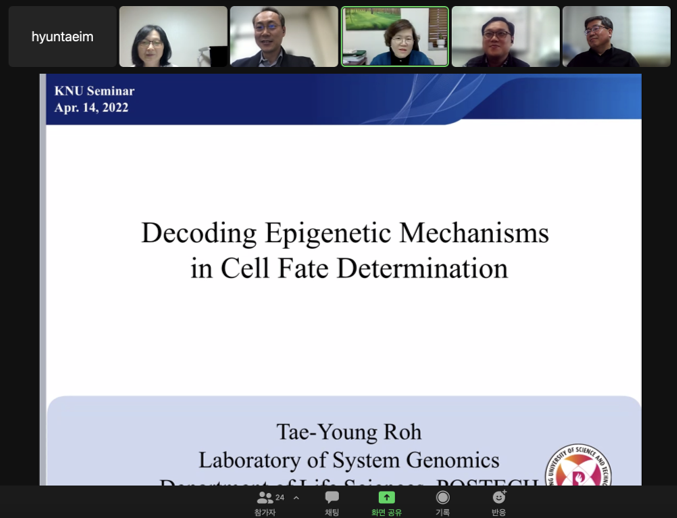생명과학연구소 제550회 정기세미나_노태영 교수님(포항공대)
페이지 정보
작성자 : 관리자 날짜 : 작성일22-05-31 09:41 조회 : 6,063회본문
일시: 2022년 4월 14일(목) 오후5시
장소: 자연과학대학 5호관 101호
zoom link: https://kangwon-ac-kr.zoom.us/j/92871978690?pwd=RVBzKzVYUmM2Sm50dGNJY1BDY2dsZz09

제550회 생명과학연구소 세미나 2022. 4. 14 (목) 오후 5시, 자연대 5호관 101호/온라인 https://kangwon-ac-kr.zoom.us/j/92871978690?pwd=RVBzKzVYUmM2Sm50dGNJY1BDY2dsZz09 |
Decoding Epigenetic Mechanisms in Cell Fate Determination
노태영 교수(POSTECH 생명과학과)
The spatiotemporal regulation of genes is important for maintaining diverse cellular activities like proliferation, differentiation and development. The heritable epigenetic control mediated by many types of histone modifications, DNA methylation, and chromatin interactions is regarded as a major mechanism for cell fate determination. Many open questions such as how cell fate is determined, how developmental programs are fine-tuned, and what causes cancer without changes in DNA sequences, can be explained by these epigenetic modifications.
We have established an integrative analysis pipelines decoding epigenetic features to understand how epigenetics responding to environmental cues affects cell fates using stem and cancer cells as model system. Here, I am going to introduce our current achievements of understanding epigenomic and transcriptomic dynamics applied to controlling various cellular activities in a cell-type specific manner. Using bladder assembloid and intestinal organoid models, we identified dynamic epigenetic regulation on stem cell differentiation and tumor plasticity. Comparative chromatin structure analysis enabled to discover key regulators from gene regulatory network. In addition, an integrative analysis of the transcriptomic and epigenomic changes confirmed cellular identity and plasticity. In summary, these multi-omics approaches revealed the effect of differential usage of epigenetic features on determining cellular identity and plasticity.
학력 및 약력
1990-1996 B.E. in Industrial Chemistry, Hanyang University, Korea
1996-1998 M.S. in Biochemistry, Seoul National University, Korea
1998-2002 Ph.D. in Biochemistry, Seoul National University, Korea
2002-2008 Visiting Fellow/Research Fellow, NHLBI / NIH, USA
2008-present Assistant, Associate, Full Professor, POSTECH, Korea
2017-2021 Review committee, HFSP
2022-presnet Director, Division of Life Science, NRF (한국연구재단)
주요발표논문 (최근)
1. Creation of bladder assembloids mimicking tissue regeneration and cancer, Eunjee Kim, …..Tae-Young Roh, Sungjune Jung, Sanguk Kim, Ja Hyeon Ku & Kunyoo Shin (co-corresponding), Nature 588:664–669 (2020).
2. Comparative analysis of commonly used peak calling programs for ChIP-Seq analysis, Hyeongrin Jeon Hyunji Lee, Byunghee Kang, Insoon Jang, Tae-Young Roh (corresponding), Genomics Inform 18(4):e42 (2020).
3. Opportunistic detection of Fusobacterium nucleatum as a marker for the early gut microbial dysbiosis, Huh JW, Roh TY. (corresponding), BMC Microbiol 20(1):208 (2020).
4. Indoor dust extracellular vesicles promote cancer lung metastasis by inducing tumour necrosis factor-α, Nhung Thi Hong Dinh, Jaewook Lee, Jaemin Lee, Sang Soo Kim, Gyeongyun Go, Seoyoon Bae, Ye In Jun, Yae Jin Yoon, Tae-Young Roh# and Yong Song Gho# (co-corresponding), Extracell Vesicles, 9(1):1766821 (2020).
5. Transcription-dependent targeting of Hda1C to hyperactive genes mediates H4-specific deacetylation in yeast Ha SD, Ham S, Kim MY, Kim JH, Jang I, Lee BB, Lee MK, Hwang JT, Roh TY, Kim TS (co-corresponding) Nat Commun. 197; Article number: 4270 (2019).








